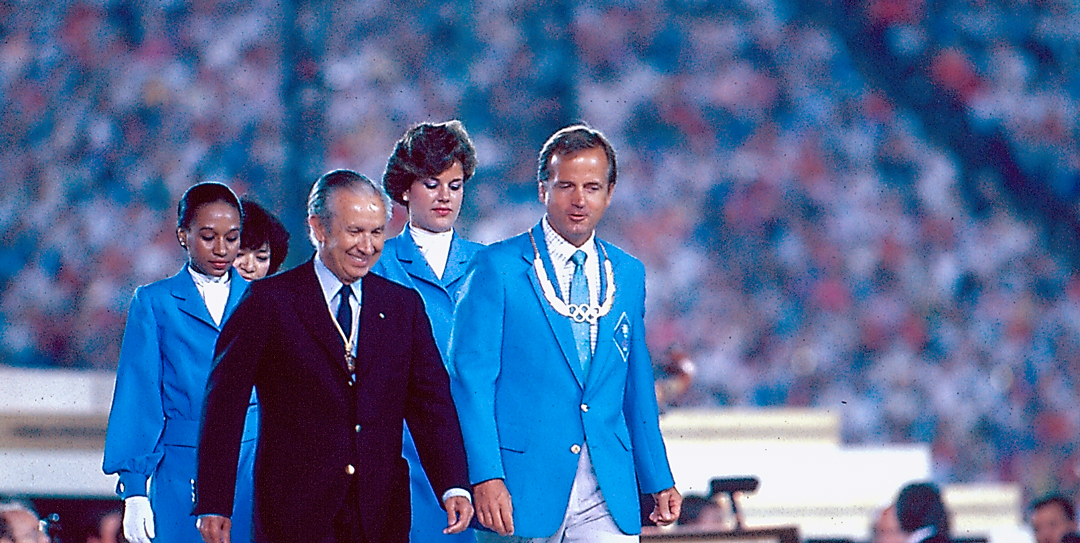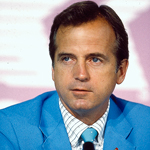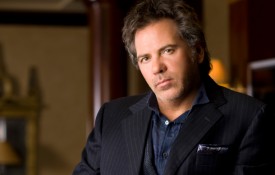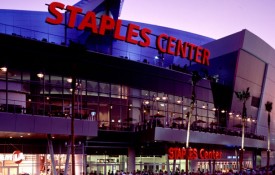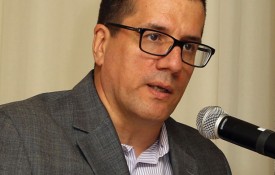Peter Ueberroth’s life changed in an instant when he was a student at Fremont High School.
He happened to be in the school’s swimming pool when a college coach came by looking for fresh recruits. Ueberroth was not much of a swimmer – he was a baseball player – but when he hurled a water polo ball from the water that smacked against the wall with a resounding bang, the coach was duly impressed.
His “live arm” earned Ueberroth a college scholarship to play water polo, and a path to the future was suddenly opened. “I had no plans to go to college,” he recalled recently. “My parents had not gone to college. I had a good job selling packages of seeds to nurseries. If I hadn’t been in the pool that day, who knows what would have happened.”
Ueberroth is sitting in the conference room of The Contrarian Group, the Newport Beach–based investment and management company that he founded in 1990. Olympic torches from Los Angeles (1984), Seoul (1988), and Beijing (2008) hang from the wall. His two dogs scurry past with tail-wagging enthusiasm.
Ueberroth didn’t immediately give up his job selling seeds when he went to college; that became his summer gig. But armed with the business degree that he earned from San Jose State, as well as a ferocious work ethic, he has shown an uncanny skill for being in the right place at the right time.
Entrepreneurial Inklings
After college, he went to work for businessman Kirk Kerkorian and his Los Angeles Air Service at the dawn of what many remember as the Golden Age of Aviation. The company (later known as Trans International Airlines) enjoyed success operating charter flights to Hawaii and other cities, and Ueberroth gained vast experience in the travel sector and a Rolodex brimming with contacts.
By then, he’d married Ginny Nicolaus in 1959, and the two had started a family (today they have four children and eight grandchildren). Ueberroth yearned to be his own boss and, as he put it, “follow the entrepreneurial startup path.” He moved his family to the San Fernando Valley and formed First Travel in 1962 to coincide with the World’s Fair in
Seattle.
The operation ran into roadblocks, and Ueberroth had to take a financial loss – barely avoiding bankruptcy. Experiencing failure was educational, though. “You get scar tissue and that always helps you,” Ueberroth says. “You learn to not get over your skis.”
He plugged away with a forceful but understated leadership style. He delegated authority to employees he trusted and built loyalty by treating people fairly and equitably. “All the other travel businesses had male managers,” Ueberroth recalls. “We went the other direction. We had only women managers.”
First Travel soon expanded into hotel reservations and management. With 1,500 employees and 200 branches, Ueberroth grew the company into the second largest travel agency in North America on the heels of American Express, grossing more than $300M annually.

Peter Ueberroth with former Los Angeles Mayor Tom Bradley
Olympic Success
In 1979, the Los Angeles Organizing Olympic Committee (LAOOC) began searching for a CEO to run the upcoming 1984 Olympics. Ueberroth was an unknown quantity; few CEOs outside of the travel industry knew of his track record. Ueberroth read in the newspaper that several prominent global business and sports leaders were being interviewed for the position. He was never interviewed for the position but was honored to meet privately with John Argue (who led the bid for the games), Paul Ziffren, Lew Wasserman, and David Wolper (a friend for many years). “They knew, if I was asked, I would accept,” Ueberroth notes.
Ueberroth sold First Travel for a tidy profit and took a massive pay cut to assume the job of CEO. He soon discovered that the Olympic Movement was in deep trouble. The 1972 Munich Games had ended in tragedy after Palestinian terrorists broke into the Olympic Village, taking members of the Israeli delegation hostage and killing them during a botched rescue attempt. The organizers of the 1976 Olympics had gone on a building-and-spending spree that left the host city of Montreal with staggering debt estimated at $1.5B.
The only other city to bid for the 1984 Olympics? Tehran. But after Tehran withdrew its bid, that left only LA, the host city of the 1932 Olympics.
The situation presented other challenges. With the United States boycott of the 1980 Moscow Olympics, Ueberroth could not count on much support within the international Olympic family. Later, the Soviet Union and their allies decided to counter the 1980 boycott with one of their own, thus jeopardizing the quality of the sports competition in LA.
Closer to home, grandstanding politicians and naysayers complained about every aspect of LA’s bid and forecast major problems with the traffic and the smog. Anti-Olympic protesters sickened Ueberroth’s dogs with poison, and he was forced to move his family from their home for safety reasons.
Because LA voters had passed an amendment that prohibited the expenditure of government funds for the Games, the LAOOC had to shoulder the entire financial onus. The 1984 Olympics were to be the first, and only, privately financed Olympic Games in modern-day history. Not one penny was received in donations.

Peter Ueberroth with David Wolper, John Argue, and
Harry Usher
Ueberroth’s entrepreneurial background proved to be the perfect fit for this task. He likened the experience to an entrepreneur launching a startup company. “I opened the first bank account [for the 1984 Olympics] with my own money,” he says. “We inched our way along.”
Ueberroth ran a lean operation in those early years and added employees only when necessary. His close-knit team curbed expenditures by deciding to utilize tens of thousands of unpaid volunteers; they avoided a common mistake by not building expensive venues that turned into white elephants immediately after the Games. Instead, they leased existing facilities throughout Southern California (including the Coliseum, the Forum, and the Sports Arena), and employed festive banners and signage to aesthetically bridge the far-flung venues.
Ueberroth’s entrepreneurial background proved to be the perfect fit for this task. He likened the experience to an entrepreneur launching a startup company.
“The good part was, nobody was paying attention to us because they thought we were going to fail,” he says. “So we were able to slowly organize the Games and develop our concepts.”
By negotiating lucrative contracts with media and corporate partners, Ueberroth transformed the financial structure of the Olympic Movement. He persuaded ABC-TV to pay a record $225M for broadcast rights and used the upfront money in the deal to provide badly need operating capital for LAOOC. He created an exclusive, tiered corporate sponsorship program that yielded another $126M and then priced event tickets to maximize profits.
Ueberroth and his team proved the naysayers wrong. By every measure the 1984 Games were a resounding success. Traffic ran smoothly, and there were no security issues. Ticket sales and attendance broke records, and Carl Lewis, Mary Lou Retton, and Joan Benoit provided athletic performances for the ages. When the Olympic flame at the Los Angeles Coliseum was extinguished, the Games had generated a whopping $232.5M surplus. It was the most profitable sporting event in history.
“We were very fortunate,” says Ueberroth. “The citizens of Los Angeles put aside their differences and welcomed the world. It was a good example of, when enough people care about anything, anything is possible.”
Some 40 percent of the surplus – approximately $93M – was earmarked for youth sports in Southern California. That windfall was used to create the LA84 Foundation, a nonprofit organization headquartered in the West Adams area. The endowment grew and since 1985 the Foundation has invested more than $230M in the community, funded more than 2,200 nonprofit organizations, and impacted more than 3 million youth.
When the Olympic flame at the Los Angeles Coliseum was extinguished, the Games had generated a whopping $232.5M surplus. It was the most profitable sporting event in history.
Contrary to Popular Belief
What do you do for an encore after being selected as Time Magazine’s Man of the Year? Ueberroth barely paused to break stride after the success of the 1984 Olympics. He immediately moved to New York and replaced Bowie Kuhn as the sixth commissioner of Major League Baseball.
After serving one term as commissioner, Ueberroth returned to the private sector in Southern California. He became chair of The Contrarian Group, with offices located not far from where he lives today with his wife Ginny and their dogs.

Ueberroth served as commissioner of the MLB from 1984 to 1989
Like its name implies, the private company approaches investment opportunities from a unique perspective. “Our philosophy is that when there’s change in business and the economy and everybody starts running in the same direction, we look in the other direction and see where nobody’s going,” he says. “It’s a good place to explore where there’s opportunities.”
“We were very fortunate … the citizens of Los Angeles put aside their differences and welcomed the world. It was a good example of, when enough people care about anything, anything is possible.”
One such opportunity came along in 1999, when the owners of Pebble Beach decided to sell the legendary golf resort on the Monterey coastline. Ueberroth gathered together four other principal partners, including Richard Ferris, Former Chairman of United Airlines, the late golf titan Arnold Palmer, and Ueberroth’s friend, actor-director Clint Eastwood, to buy the crown jewel of California golf properties for a reported $820M, a sale that included several hotels.
“A lot of fine companies bid on it, but we decided to do it in a way that would appeal to the sellers,” he says. “We told them that we would never resell or break up the property – that we would be stewards in perpetuity. It was a strategy that worked, and the rest is history.” Today, Contrarian’s portfolio of investments includes numerous travel, aviation, technology, and golf properties. “I don’t want to be in any business that has the possibility of harming society,” Ueberroth states. “I don’t want to be in any business that isn’t diverse. If there’s going to be gender inequality or racial inequality, we want nothing to do with it.”
His business philosophy is an anti-philosophy, no surprise coming from someone who has always taken an unconventional approach. “I don’t spend much time thinking of the past,” he says. “I don’t spend much time pontificating. I tell people to get experience in menial jobs when they’re young. It’s the greatest education because you learn about a lot of things that way.”
A Graceful Leader
Now 79, Ueberroth refuses to slow down. He is currently chairman of the board of directors of Aircastle, a Stamford, Conn.-based public company that acquires, leases, and sells commercial planes to airlines throughout the world. He serves on numerous boards of directors (for The Irvine Company and Easton-Bell Sports, among others), remains an active philanthropist through the Peter and Ginny Ueberroth Family Foundation, and is a trustee at the University of Southern California.

Tom Bradley, former LA City Councilman John Ferraro, Peter Ueberroth, and Ira Reiner in August of 1981
Away from the boardroom, Ueberroth plays golf with partners “who are better than me” a couple times a week but he insists on carrying his own bag and walking the 18 holes. He still travels the world but likes nothing better than spending time on the family ranch in northern Idaho on the Canadian border, where they farm alfalfa, timber, and cattle.
“It’s the game, it’s the competition, it’s the challenge,” he says. “If you don’t keep your mind challenged, you get old. The good Lord will take me away, but I’m not going to rush it.”
All photos courtesy of LA84 Foundation, Peter Ueberroth






































